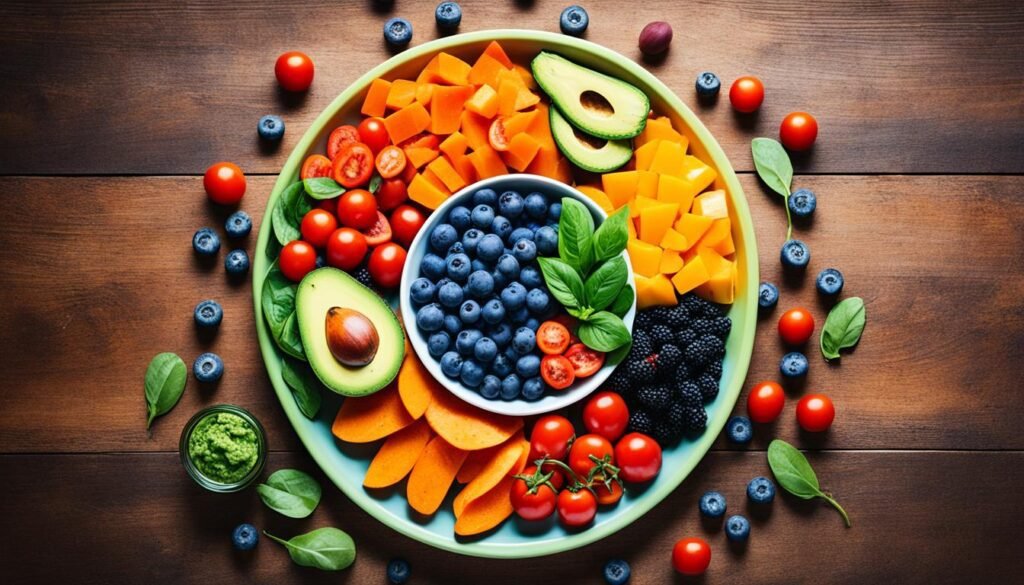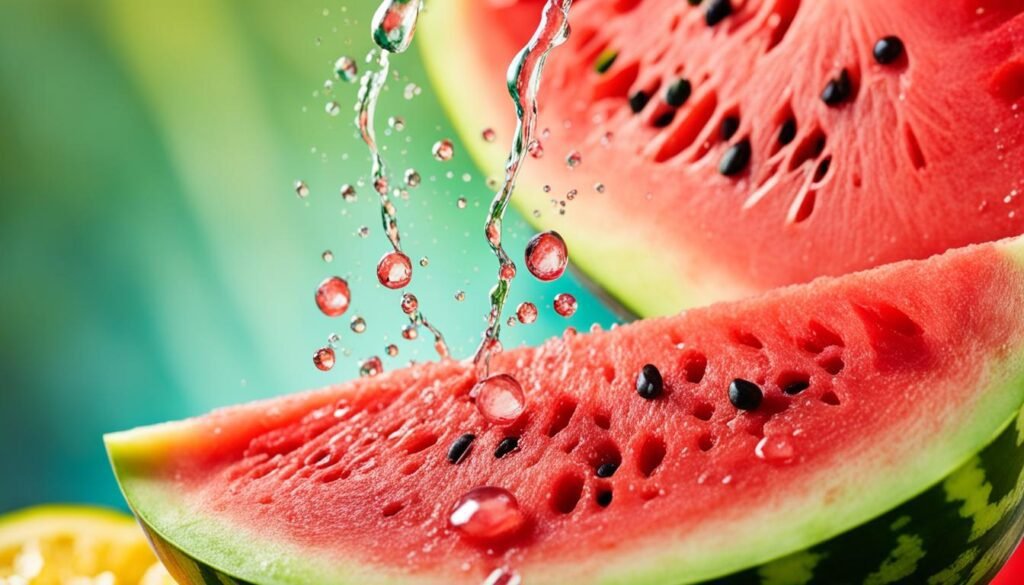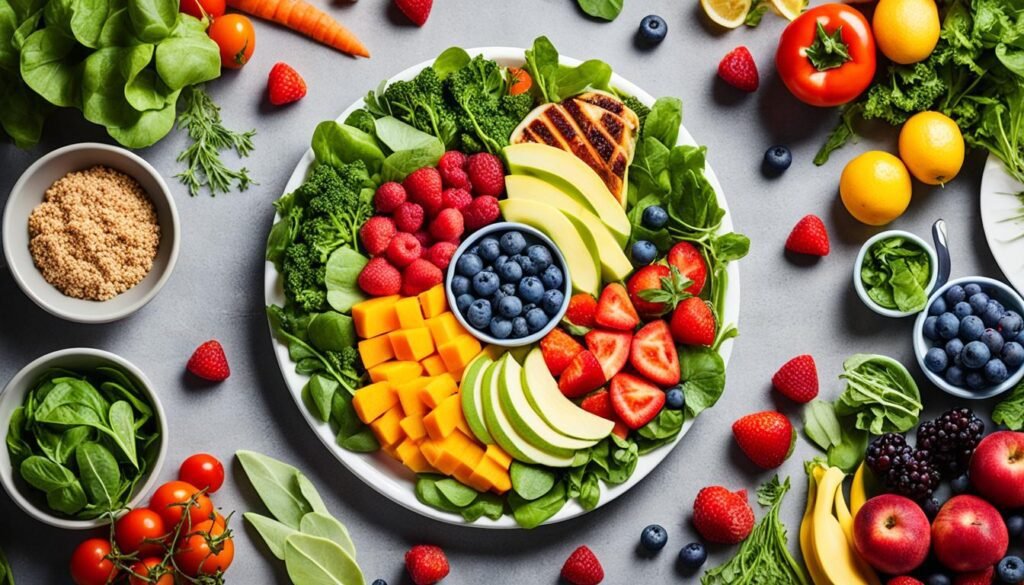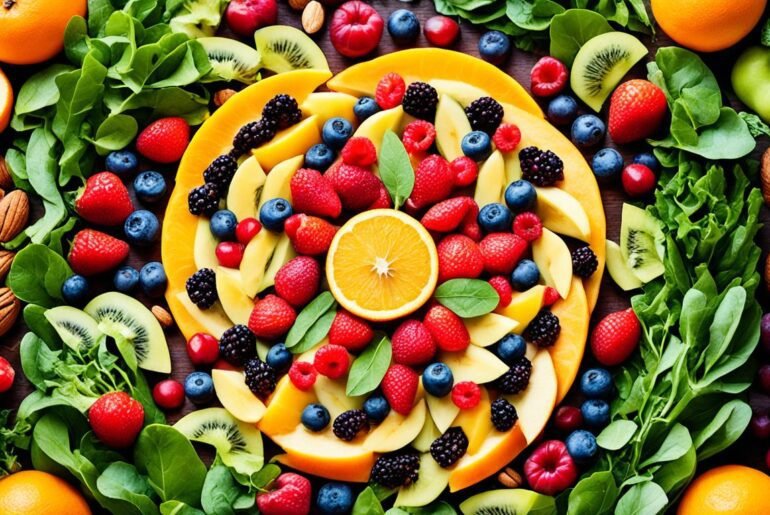Did you know that the food you eat can directly impact the health and appearance of your skin? It’s true. The link between nutrition and skin health is undeniable, with research supporting the idea that what we put into our bodies can have a profound effect on our skin’s vitality. By following a tailored nutrition plan that focuses on nourishing your skin through targeted dietary choices, you can achieve that coveted healthy, glowing complexion you’ve always wanted.
Key Takeaways:
- A nutrition plan plays a vital role in promoting healthy skin.
- Inflammation can negatively impact skin health, while anti-inflammatory foods can help combat this.
- Foods rich in omega-3 fatty acids, antioxidants, and essential nutrients are beneficial for skin health.
- Including specific foods like avocados, walnuts, and sweet potatoes in your diet can promote radiant and healthy skin.
- Antioxidants, such as vitamin C and E, are crucial for maintaining skin health and preventing premature aging.
The Link Between Nutrition and Skin Health
Research shows that what we eat can directly impact the health of our skin. Consuming certain nutrients and avoiding harmful compounds can promote skin health. For example, foods that are rich in omega-3 fatty acids, like fatty fish, can reduce inflammation and keep the skin moisturized. Avoiding fried foods and sugar bombs can also prevent damage to the skin’s collagen, which can lead to wrinkles and sagging. Choosing whole plant foods over processed options provides antioxidants that protect the skin from oxidative damage and promote a youthful appearance.
By incorporating a healthy skin diet into your lifestyle, you can nourish your skin from the inside out. Eating skin-friendly foods can enhance your skin’s natural glow and improve its overall health. Let’s dive into some of the key nutrients and foods that can have a positive impact on your skin.
Omega-3 Fatty Acids: These essential fatty acids play a crucial role in maintaining skin health. They help reduce inflammation and keep the skin moisturized, leading to a smoother and more supple complexion. Sources of omega-3 fatty acids include:
- Fatty fish like salmon, mackerel, and sardines
- Walnuts and flaxseeds
- Chia seeds and hemp seeds
Avoiding Pro-Inflammatory Foods: Certain foods can trigger inflammation in the body, which may exacerbate skin conditions like acne, eczema, and psoriasis. Limiting or avoiding the following foods can help maintain skin health:
- Fried and processed foods
- Sugary snacks and drinks
- Refined grains and high-glycemic index foods
Antioxidant-Rich Foods: Antioxidants are essential for protecting the skin from oxidative damage caused by harmful free radicals. Including antioxidant-rich foods in your diet can help maintain a youthful appearance and prevent premature aging. Some examples of skin-friendly antioxidant foods are:
- Berries like blueberries, strawberries, and raspberries
- Dark leafy greens such as spinach and kale
- Colorful fruits and vegetables like oranges, tomatoes, and bell peppers
Here’s a visual representation of skin-friendly foods that promote skin health and nourishment:
Skin-Friendly Foods for Healthy Skin
| Category | Foods |
|---|---|
| Omega-3 Fatty Acids | Fatty fish, walnuts, chia seeds |
| Antioxidant-Rich Foods | Berries, dark leafy greens, colorful fruits and vegetables |
Foods for Radiant Skin

To achieve radiant, healthy skin, it’s important to include specific foods in your diet that nourish and support your skin health. These skin-friendly foods provide essential nutrients and antioxidants that promote a glowing complexion. Incorporating a variety of these ingredients into your meals can help you achieve the skin you’ve always desired.
Avocados: Avocados are a powerhouse when it comes to promoting healthy skin. The healthy fats found in avocados help keep the skin moisturized and protected from sun damage. Additionally, avocados contain vitamin E, which acts as an antioxidant and helps to maintain the skin’s youthful appearance.
Walnuts: Walnuts are not only delicious but also rich in essential fatty acids, such as omega-3s, which are vital for skin health. These fatty acids help to maintain the skin’s integrity and combat inflammation, reducing the risk of skin conditions like acne and eczema. Incorporating walnuts into your diet can contribute to a healthier complexion.
Sweet Potatoes: Adding sweet potatoes to your meals can do wonders for your skin health. Sweet potatoes are an excellent source of beta carotene, a compound that converts to vitamin A in the body. Vitamin A acts as a natural sunblock, helping to prevent sun damage and maintain a youthful appearance.
Red or Yellow Bell Peppers: Including red or yellow bell peppers in your diet can provide your skin with a boost of skin-friendly nutrients. These peppers are loaded with vitamin C and carotenoids, which act as antioxidants and protect the skin from sun damage. They also promote collagen production, enhancing the skin’s elasticity and overall health.
By incorporating these foods into your diet, you can nourish your skin from within and achieve a radiant complexion. Remember, true beauty starts from the inside out.
| Foods for Radiant Skin | Benefits |
|---|---|
| Avocados | Provides healthy fats for moisturized and sun-protected skin, contains vitamin E as an antioxidant. |
| Walnuts | Rich in essential fatty acids that support skin health and combat inflammation. |
| Sweet Potatoes | Contains beta carotene, a natural sunblock that helps prevent sun damage. |
| Red or Yellow Bell Peppers | High in vitamin C and carotenoids for sun protection and collagen production. |
The Role of Antioxidants in Skin Health
Antioxidants play a crucial role in maintaining skin health. They protect the skin from oxidative damage caused by free radicals and inflammation. Vitamin C, an essential antioxidant, is responsible for collagen synthesis, which keeps the skin firm and strong. Vitamin E, another powerful antioxidant, shields the skin from damage and accelerates healing.
Including foods rich in antioxidants, such as tomatoes and berries, in your nutrition plan can enhance skin health and prevent signs of aging. These antioxidant-rich foods provide the necessary nutrients to combat free radicals and promote a youthful complexion.
Emphasis on Vitamin C and Vitamin E
Vitamin C: This potent antioxidant supports the synthesis of collagen, a protein that maintains the skin’s structure and elasticity. It also aids in protecting the skin from environmental damage, such as sun exposure and pollution.
Vitamin E: Known for its excellent antioxidant properties, vitamin E combats free radicals and protects the skin from oxidative stress. It also assists in reducing inflammations and promoting skin healing.
The Benefits of Antioxidant-Rich Foods
By incorporating antioxidant-rich foods into your nutrition plan, you can nourish your skin and promote its overall health. Here are some examples of antioxidant-rich foods:
- Tomatoes: Rich in vitamin C, which stimulates collagen production and fights against free radicals.
- Berries: Packed with antioxidants and various vitamins, berries offer protection to the skin and support its rejuvenation process.
- Spinach: Contains vitamins C and E, as well as other antioxidants that contribute to healthy skin.
- Nuts and seeds: Almonds, walnuts, and sunflower seeds provide vitamin E and other essential nutrients to maintain skin vitality.
By incorporating these antioxidant-rich foods into your nutrition plan, you can enhance the health and appearance of your skin.
Soy for Skin Health

When it comes to nourishing your skin through nutrition, soy is a powerful ingredient that can provide numerous benefits. Soy contains isoflavones, which are plant compounds that have been shown to improve skin elasticity, reduce wrinkles, and promote collagen production. In fact, studies have found that consuming soy isoflavones can help increase skin’s moisture levels, particularly for postmenopausal women who may experience dryness.
Soy-based foods like tofu or soy milk can be excellent additions to your nutrition plan for healthier and more youthful-looking skin. By incorporating soy into your diet, you can enhance the overall health and appearance of your skin, helping it maintain elasticity and reducing the signs of aging.
“Including soy-based foods in your diet can provide your skin with isoflavones, compounds that can improve skin elasticity and reduce wrinkles.” – Dr. Maria Thompson, Dermatologist
The Power of Spices and Herbs
Spices and herbs are not just flavorful additions to your meals; they also offer numerous benefits for skin health. Many spices and herbs contain antioxidants that protect the skin from oxidative damage and inflammation, promoting healthy and radiant skin.
Turmeric, with its vibrant yellow color and earthy flavor, is a spice well-known for its antioxidant and anti-inflammatory properties. It contains a compound called curcumin, which has been shown to have various health benefits, including improving skin conditions such as acne, eczema, and psoriasis.
Ginger is another spice that can work wonders for your skin. It’s rich in antioxidants that help fight inflammation and oxidative stress, both of which can contribute to skin aging. Ginger also has antimicrobial properties that can help combat acne-causing bacteria.
Cinnamon is not just a delicious spice; it also has impressive benefits for skin health. It has antioxidant and anti-inflammatory properties that can help reduce skin inflammation and irritation. Cinnamon also improves blood circulation, which aids in the delivery of nutrients to the skin cells, promoting a healthy complexion.
“Including these spices in your cooking can enhance the health and appearance of your skin, offering a natural and flavorful way to support your skincare routine.”
By incorporating these spices into your cooking, you can take advantage of their antioxidant and anti-inflammatory properties, promoting healthy skin from within. Whether you add turmeric to your curry, ginger to your stir-fries, or cinnamon to your morning oatmeal, these spices can contribute to your overall skin health.
| Spice/Herb | Antioxidant Content | Anti-Inflammatory Properties |
|---|---|---|
| Turmeric | High | Yes |
| Ginger | Moderate | Yes |
| Cinnamon | High | Yes |
The table above provides an overview of the antioxidant content and anti-inflammatory properties of turmeric, ginger, and cinnamon.
Spices and Herbs for Skin Health: A Recipe Inspiration
Looking for a recipe that incorporates these skin-friendly spices and herbs? Try this delicious and nutritious turmeric ginger roasted cauliflower:
- Preheat your oven to 425°F (220°C).
- In a bowl, combine 1 head of cauliflower (cut into florets), 2 tablespoons of olive oil, 1 teaspoon of turmeric powder, 1 teaspoon of ginger powder, ½ teaspoon of garlic powder, salt, and pepper to taste.
- Toss everything together until the cauliflower florets are evenly coated.
- Spread the cauliflower out on a baking sheet lined with parchment paper.
- Roast in the preheated oven for 25-30 minutes or until golden brown and crispy.
- Remove from the oven, and serve as a flavorful side dish or as a topping for salads.
This recipe showcases the combination of turmeric and ginger, providing a tasty and skin-loving dish that is packed with antioxidants and anti-inflammatory properties.
Hydration and Skin Health

Proper hydration plays a crucial role in maintaining healthy skin. When it comes to skin health, drinking enough water is essential for improved elasticity, decreased dryness, and reduced roughness. Staying hydrated helps ensure that your skin remains moisturized and supple, giving it a youthful and glowing appearance.
On the other hand, consuming sugary beverages can have detrimental effects on your skin. High sugar intake has been linked to increased inflammation, which can lead to various skin issues, including adult acne. Moreover, sugary drinks can contribute to dehydration, further exacerbating skin problems.
To prioritize your skin’s overall health and appearance, it is important to choose water as your primary source of hydration. Water helps flush out toxins from your body, keeping your skin clear and radiant. Aim to drink at least eight glasses of water per day to ensure optimal hydration for your skin.
The Importance of a Balanced Diet

Maintaining a balanced diet is crucial for overall health, including the health of your skin. Consuming a variety of fruits, vegetables, whole grains, lean proteins, and healthy fats ensures that your body receives the necessary nutrients to support skin health.
A balanced diet provides a range of essential vitamins, minerals, and other nutrients that play various roles in skin health. For example, vitamin C is essential for collagen synthesis, which keeps the skin firm and strong. It also acts as an antioxidant, protecting the skin from damage caused by free radicals. Vitamin E is another powerful antioxidant that helps protect the skin from oxidative damage and promotes healing.
| Nutrient | Role in Skin Health | Sources |
|---|---|---|
| Vitamin C | Promotes collagen synthesis and acts as an antioxidant | Citrus fruits, bell peppers, strawberries |
| Vitamin E | Protects the skin from oxidative damage and promotes healing | Almonds, spinach, sunflower seeds |
| Omega-3 fatty acids | Reduce inflammation and keep the skin moisturized | Fatty fish, chia seeds, flaxseeds |
| Zinc | Supports skin cell growth and repair | Shellfish, legumes, pumpkin seeds |
In addition to these specific nutrients, a balanced diet provides a diverse range of other vitamins, minerals, and antioxidants that contribute to overall skin health. By prioritizing a balanced diet that includes a variety of nutrient-dense foods, you can help your skin achieve and maintain a healthy, glowing appearance.
Remember, achieving healthy skin through nutrition is a long-term commitment. Consistency is key, so make sure to incorporate a balanced diet into your daily routine along with other healthy lifestyle habits.
Lifestyle Factors for Healthy Skin

While a nutritious diet plays a crucial role in maintaining healthy skin, there are other lifestyle factors that can significantly contribute to its overall health and appearance. Incorporating these factors into your routine, alongside a proper nutrition plan, can optimize the health and vitality of your skin.
Regular Exercise
Regular exercise not only benefits your overall well-being but also promotes healthy skin. Physical activity helps reduce inflammation in the body, which can have a positive impact on your skin. Additionally, exercise improves blood circulation, ensuring that essential nutrients reach your skin cells, keeping them nourished and promoting skin health.
Stress Management
Managing stress levels is crucial for maintaining healthy skin. Excessive stress can trigger various skin issues, such as acne, eczema, and psoriasis. Finding effective stress management techniques, such as practicing mindfulness, engaging in relaxation exercises, or seeking therapy, can help minimize the negative impact of stress on your skin.
Adequate Sleep
Sleep plays a vital role in skin rejuvenation and repair. During sleep, your body goes through a process of cellular repair, which includes the restoration of skin cells. Lack of sufficient sleep can lead to dull, tired-looking skin, as well as the development of fine lines and wrinkles. Prioritizing quality sleep by establishing a bedtime routine and ensuring a comfortable sleep environment can contribute to healthy, glowing skin.
By incorporating regular exercise, effective stress management techniques, and adequate sleep into your lifestyle, you can optimize the health and appearance of your skin. These lifestyle factors, combined with a nutritious diet, create a holistic approach to skin health that promotes a radiant and youthful complexion.
Conclusion
Nourishing your skin through proper nutrition is a fundamental step towards achieving and maintaining healthy, glowing skin. By following a well-designed nutrition plan that incorporates anti-inflammatory foods, antioxidants, and essential nutrients, you can effectively support the overall health and appearance of your skin.
However, a healthy skin diet is not the only factor to consider. Implementing a holistic approach that encompasses a balanced diet with other lifestyle choices is equally essential. Managing stress, engaging in regular exercise, and prioritizing sufficient sleep all contribute to the optimal health of your skin.
By making these conscious choices, you can develop a nutrition plan specifically tailored to nourish your skin and achieve lasting radiance. Remember, consistency is key in seeing results, so embrace healthy habits and enjoy the journey towards vibrant and healthy skin.
FAQ
What role does nutrition play in the health of our skin?
Nutrition plays a significant role in the health and appearance of our skin. What we eat can impact inflammation levels, collagen production, and overall skin health.
What are some skin-friendly foods that I can include in my diet?
Avocados, walnuts, sweet potatoes, and red or yellow bell peppers are examples of skin-friendly foods that provide essential nutrients for healthy skin.
How do antioxidants contribute to skin health?
Antioxidants protect the skin from oxidative damage caused by free radicals and inflammation. They play a crucial role in maintaining a youthful appearance and preventing signs of aging.
Does consuming soy benefit the health of the skin?
Yes, consuming soy isoflavones can improve skin elasticity, reduce wrinkles, increase collagen production, and combat skin dryness.
Can spices and herbs promote skin health?
Yes, many spices and herbs contain antioxidants and anti-inflammatory properties, which contribute to skin health by protecting against damage and inflammation.
How does hydration affect skin health?
Proper hydration is essential for healthy skin. Drinking plenty of water improves skin elasticity and decreases dryness and roughness.
Is a balanced diet important for skin health?
Yes, a balanced diet that includes a variety of fruits, vegetables, whole grains, lean proteins, and healthy fats provides the necessary nutrients for optimal skin health.
Which lifestyle factors contribute to healthy skin?
Regular exercise reduces inflammation, stress management prevents skin issues like acne, and adequate sleep promotes skin rejuvenation and repair.
How can I develop a nutrition plan for healthy skin?
By incorporating anti-inflammatory foods, antioxidants, essential nutrients, and healthy lifestyle habits, you can develop a personalized nutrition plan for healthy, glowing skin.




